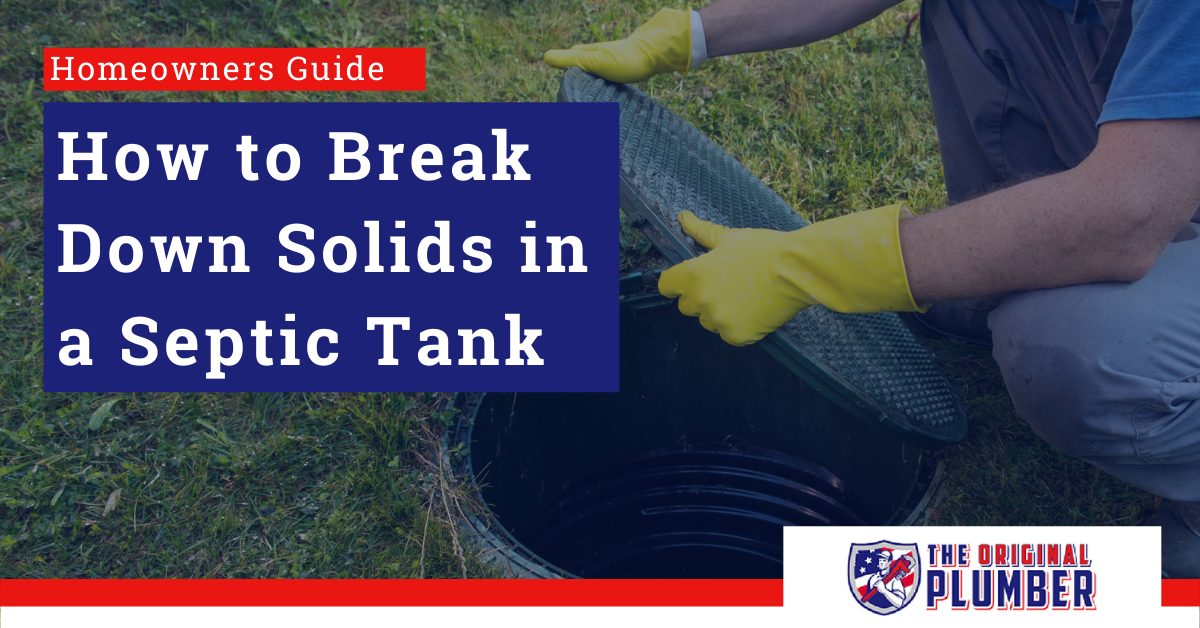One of the last things you want to spend time thinking about is your septic tank. When it comes to learning how to break down solids in a septic tank, you may feel overwhelmed and confused. But if you own a home with a septic system, there are some things you need to know to prevent bigger problems in the future.
How Do I Know If I Have a Septic Tank?
When you purchased your home, this information would have been part of the inspection process. If it’s been a while and you’re not sure, take a look at where you live. Homeowners in rural areas often have a septic system and septic tank.
You can also:
- Take a look at your yard and look for any unusual raises in the horizon
- Talk with your neighbors to see if they have one and where it’s located in their yard
- Look at your water bill; if you don’t have one from the county, you’re likely on a septic system
- Contact your local government to get a copy of your property records
Learn more about how to know if you have a septic tank in this blog post.
How Do I Take Care of My Septic System?
Once you’ve figured out that you have a septic tank and where it is, you’re probably wondering how to take care of it.
Naturally occurring bacteria inside your septic tank work to dissolve and consume the solid waste. This is the good bacteria you need to help keep your septic tank system working properly. The liquid in your tank then drains through small holes in the pipes into your drain field.
One of the first things you’ll want to do is schedule an inspection of your septic tank. Having a professional come out to inspect your septic system will let you know the current state of your septic tank.
You’ll also want to make sure that you’re using products that are safe for your system. Using septic-safe toilet paper is one way to help take care of your septic tank. This toilet paper is specifically designed to break down best for your septic system. You also don’t want to use too much toilet paper if you have a septic system.
That being said, you don’t want to flush any inorganic materials down your toilet. You should only be flushing toilet paper and human waste! Flushing things like diapers, feminine hygiene products, or too much toilet paper can create a septic backup.
Antibacterial products can disrupt the bacteria balance of your septic system. It’s great for killing the bacteria on your hands, but it can also kill the good bacteria in your healthy septic system if too much of it is going down your drain. Septic systems rely on healthy bacteria to break down solid wastes that enter the tank.
How Do I Break Down the Solids in My Septic Tank?
You’ll need to know the size of your septic tank. Knowing the size of your tank will make sure that you’re using the correct amount of septic tank treatment for your septic tanks.
Using septic tank treatment with harmful chemicals for larger septic tanks can kill the healthy bacterial ecosystem that your septic system needs to function optimally. Additionally, using a treatment that’s for smaller septic tanks won’t have the outcome you’re expecting. This could mean you’ll need to do a septic tank treatment more frequently.
Most septic tank treatments are suggested to be done on a monthly basis. You can try to find products that have a three, six, or yearly treatment option if that works better for you. Please note that we are not talking about drain cleaners here but treatments.
Set a reminder for yourself to do the septic tank treatments to maintain your septic system.
The key to maintaining the level of solids in your septic tank all depends on the bacteria living in your septic tanks. Without the correct level of bacteria, your tank can fill up more quickly. It can also cause issues with your pipes, drain field, scum layer, and entire septic system.
Choose the septic tank treatment that works best for you. Here are a few things you can do to help you break down the solid waste in your septic tank:
Active Yeast
Add ¼ to ½ cup of active dry yeast to your toilet bowl and flush it down your toilet. The yeast will need to sit in your pipes to work best so try to avoid things like running your dishwasher or taking a shower to wash the yeast down too quickly. Yeast helps keep the bacteria and enzymes happy in septic systems.
Rotten Tomatoes
It might sound a little bit strange, but they have proteins called pectinase. These things break down pectin and plant cell walls. All of this helps with the decomposition of solid waste and recycling waste plant materials which are all good things for your septic system.
Cut your rotten tomatoes into small chunks and run them down your garbage disposal. Be sure to run some water down the drain too so you don’t clog your pipes. You’ll only need three to four rotten tomatoes a few times a year to keep your bacteria happy.
Hydrogen Peroxide
This used to be a common recommendation to help break down the solids in your septic tank. It takes some time to be sure it’s properly diluted to use. You don’t often see this suggested anymore because it can be very harmful to the soil and cause issues with your drain field.
Inorganic Acids
While these are great to clear clogs, they can be harmful to your septic tank. They can kill off the bacteria in your tank, causing raw sewage leaks and a much larger problem. These harsh chemicals can also cause damage to the pipes and walls of your septic system.
Chemicals
You can purchase chemicals to add to your septic tank to help break down the solids in your tank. Be sure to follow the directions on the packaging so you don’t cause any damage to your septic system.
Pumping
One way to be sure you’re getting rid of the solids in your septic tank is to have a professional come pump your septic tank. Getting your tank pumped can be a big job and should be used as part of your septic tank maintenance plan.
Be prepared to have your septic tank pumped. There’s a bad odor when they’re removing the waste and sludge. Periodic pumping can be a great piece of your septic tank treatment plan to keep your septic tank working properly.
What Happens When My Septic Tank is Full?
Since you can’t see your septic tank, you might wonder how you’ll know when your septic tank is full. It’s not one of those things you can just forget about.
We recommend you plan to have your septic tank emptied every three to five years. This prevents a sewage backup from happening. This is also the same guideline from the Environmental Protection Agency.
It’s important to work with a licensed professional so there’s no damage to your septic tank, drainage field, or septic system. Our team of licensed plumbers can come out, remove the septic tank lid, and do septic stirring to break up the scum solids. As gross as that sounds, it’s a common method to take care of your septic system.
The professionals at The Original Plumber & Septic can come out to inspect your septic system. Our team will also come out to empty your septic tank. Our friendly and helpful team members can give you a free estimate when you give us a call. We can also schedule your septic tank pumping to keep your septic system functioning properly in the Atlanta area.




